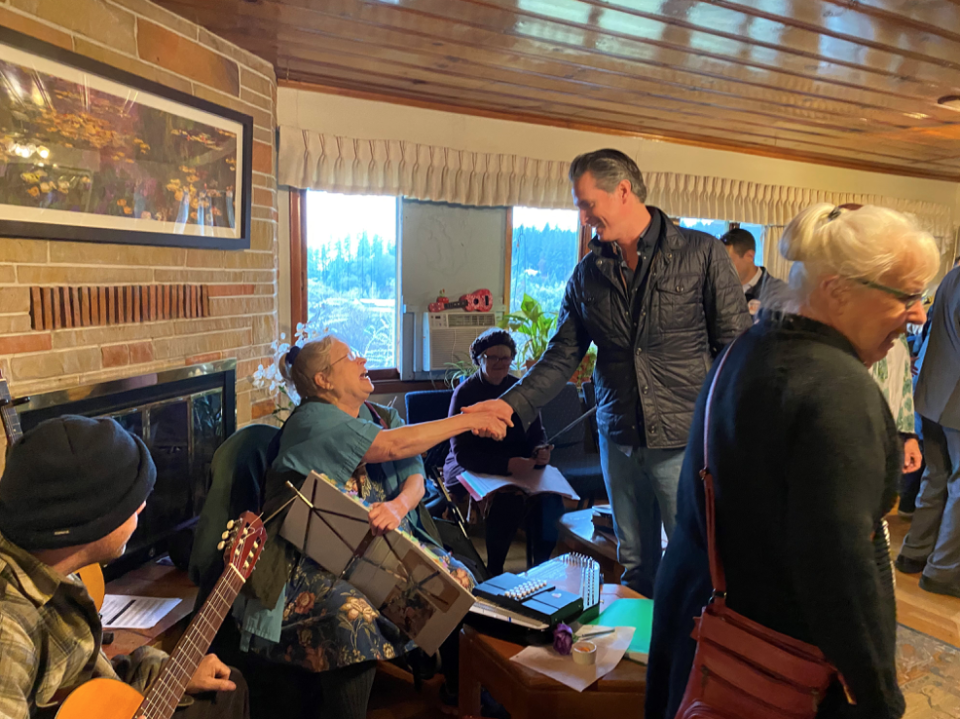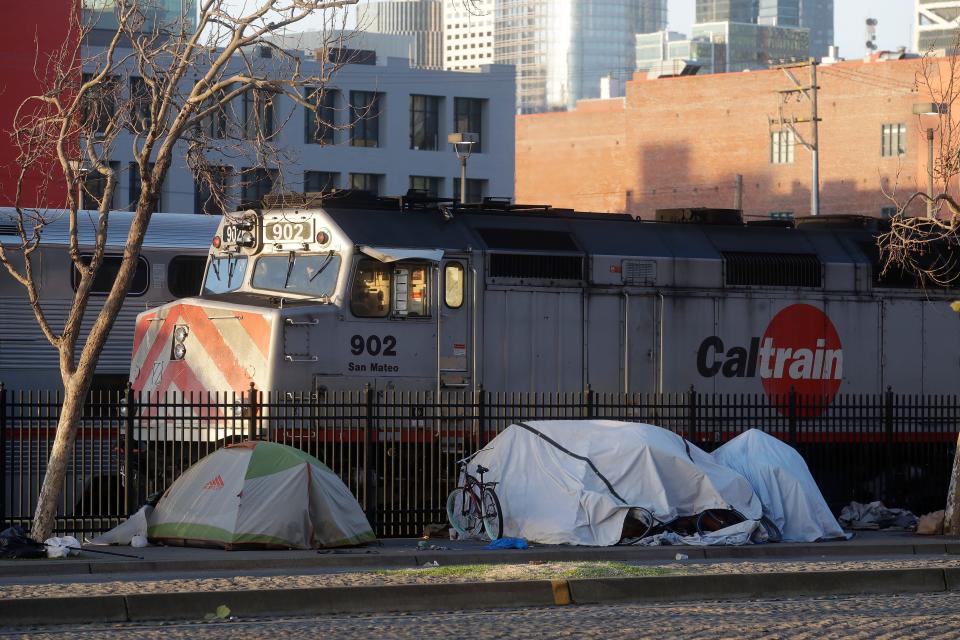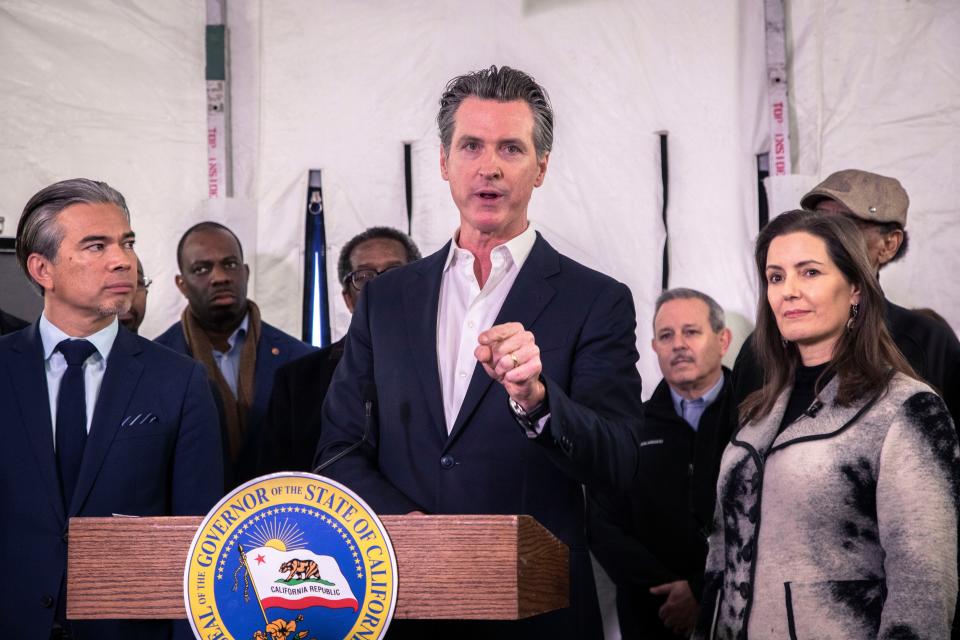As Trump visits CA, Governor Newsom calls homelessness issue 'a disgrace', vows change
SAN FRANCISCO — California Gov. Gavin Newsom broke from tradition Wednesday and dedicated his entire State of the State speech to one problem vexing the state: homelessness.
"Let's call it what it is, a disgrace, that the richest state in the richest nation, succeeding across so many sectors, is failing to properly house, heal and humanely treat so many of its own people," Newsom said. "Every day, the California Dream is dimmed by the wrenching reality of families, children and seniors living unfed on a concrete bed."
Among a variety of proposals highlighted in the governor's speech, Newsom said he would deploy trailers for the homeless to half a dozen counties, reduce street homelessness through emergency actions, and help homeless people who are mentally ill get the help they need.
All California, all the time: A newsletter that wraps up all things on the Golden State. Sign up here.
"The public has lost patience, you have all lost patience, and so have I," said Newsom.
The governor's focus on homeless came a day after President Donald Trump blasted California's homeless crisis while in Los Angeles. Although the president's visit was mainly for fundraising events and 2028 Summer Olympics talks, he made time to reiterate his previous warnings that if the state didn't address its homelessness issue, federal officials would step in and "clean it up."

California is home to roughly 140,000 people living on the streets — about a quarter of the nation's homeless population.
For Newsom, 52, homelessness is fast emerging as a critical crucible, one that threatens to potentially derail his re-election hopes in 2022 if tangible solutions are not found. To date, Newsom's administration has allocated $1.5 billion to help local governments tackle homelessness, but evidence of big changes remain elusive.
CA Republicans eager for change
The speech drew optimistic if cautious kudos from both sides of the political aisle.
State Sen. Scott Wiener (D-San Francisco) said Newsom's remarks "give me hope that we will see real change this year. Too many Californians are suffering, and we have an obligation to move the dial by making deep structural change."
Assembly Republican Leader Marie Waldron of Escondido)applauded the governor's singular focus while citing Democratic resistance to some measures meant to alleviate the problem.
“The governor is right that building more housing is needed," Waldron said in a statement. "Unfortunately, Democratic policies have stood in the way of housing production for years. That needs to change."
Waldron added that "well-intentioned environmental laws have been hijacked by special interests to tie up badly needed new homes," while rent control in cities such as San Francisco has "discouraged new construction and mandates have driven costs through the roof."
Newsom, a former San Francisco mayor and state lieutenant governor, was elected to California's top post in 2018, inheriting not only a $7 billion budget surplus but also a powerful supermajority in the state's Legislature.
His tenure has quickly come to be defined not just by constant sparing with Trump — whose administration California has sued more than 60 times over issues ranging from immigration to the environment — but by a trio of pressing problems: homelessness, housing and income inequality, as well as a wildfire-fueled public utility quagmire.
In his speech Wednesday, Newsom said his administration would get even more aggressive about getting more Californians off the streets. He also said the problem predates him, with previous politicians ignoring the problem.
Newsom said that although in 2005, there were some 35,000 more homeless people in the state than today, officials from both parties over the years had abdicated their responsibility to help their fellow citizens.
"Every homeless Californian living on a boulevard of broken dreams is a casualty of institutional failures, a person who has fallen through every possible hole in the safety net," he said.
Newsom noted that often minorities and people of color suffer the most, with black Californians making up 8% of the state's population but 42% of its homeless. He also cited a recent poll that noted nearly half of Latinos are afraid they or their families will fall into homelessness.
Solutions: Trailers, mental health care
As to solutions, Newsom said travel trailers of the kind already deployed to Oakland and Los Angeles County would be headed to Santa Clara, Riverside, Contra Costa and Sonoma counties, as well as the city of Stockton.
In January, Newsom ordered 15 trailers to Oakland to provide supplementary housing for the homeless. In February, 30 trailers made their way to Los Angeles.

Newsom said the state will immediately make 286 state properties, ranging from vacant lots to armories, available to local governments at no cost for the purpose of housing the homeless. The governor also proposed that shelters and permanent supportive housing locations statewide be exempt from time-consuming environmental review, an expansion of a bill that currently applies only to shelters in Los Angeles.
"We need more housing, not more delays," Newsom said.
Housing or the lack of it continues to plague the state. Senate Bill 50, an effort to force cities to allow for more building around dense urban cores in order to put people closer to jobs and reduce commuter-car traffic, was the subject of fierce debate for more than a year before it ultimately failed to pass.
Newsom proposed Wednesday that the Legislature agree to invest $750 million into a new California Access to Housing Fund, which would go towards solutions such as financing innovative housing models and providing temporary rent subsidies so people don't fall into homelessness.
"It's time to muster the political will to meet this moment," Newsom said.
While many of today's homeless are victims of soaring housing costs and staggering income inequality issues — in tech-centric San Francisco, the richest earn 12.2 times more than the poorest, according to the Public Policy Institute of California — others have chronic mental health issues that keep them on the streets.
Noting that 25% of California's 40 million residents "suffer from some type of behavioral health condition," Newsom said his $695 million budget request to boost that state's Medi-Cal health care system is designed specifically to address the mental and physical health care needs of the homeless, children and those in the criminal justice system.
Newsom also said conservatorship laws need to be reviewed to make it easier for city and county governments to provide the mentally ill with help.

The state should do this "all within the bounds of deep respect for civil liberties and personal freedoms, but with an equal emphasis on helping people into the life-saving treatment that they need at the precise moment they need it."
Newsom stands to secure valuable political points for tackling an issue that is increasingly important to voters across the political spectrum.
In a poll last fall, the Public Policy Institute of California found a majority of Republicans, Independents (both 61 percent) and Democrats (59 percent) said they were “very concerned” about homelessness in their communities. That sentiment echoed across the Golden State, with concerned voices found in the Bay Area (63 percent), Los Angeles (60 percent), Inland Empire (58 percent), Orange County and San Diego (55 percent) and the Central Valley (52 percent).
Newsom picked up on that universality toward the end of his speech.
"After all," he said, "homelessness isn't a blue or red issue. It's an everyone issue, a blight on the soul of America."
Follow USA TODAY national correspondent Marco della Cava: @marcodellacava
This article originally appeared on USA TODAY: Homelessness a 'disgrace,' CA governor says in speech vowing change

